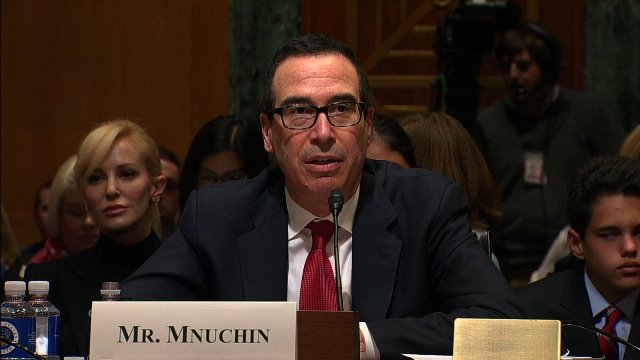Treasury Secretary Steven Mnuchin is promising that the Trump administration will get tax reform passed by August, although he says it will be years before it kicks economic growth into a higher gear.
Winning quick approval could prove challenging. There hasn’t been tax reform on the scale that President Trump is proposing in 30 years, and that was only passed in the second term of the Reagan administration.
But Mnuchin told CNBC on Thursday that the administration and Republican leaders in Congress have already agreed on “the majority of where we are on tax reform.”
He said tax reform will focus on middle-class tax cuts, tax simplification and lower corporate tax rates, all promises Trump made as a presidential candidate.
Mnuchin also said lower tax rates for high-income Americans will be offset by the elimination of some tax deductions.
He said he expects the administration to use optimistic economic growth forecasts of 3% or more when it estimates the cost of tax reform. He admitted that congressional estimates will project a bigger hit to the federal deficit because of slower growth forecasts.
The U.S. economy grew 1.6% in 2016, and the Federal Reserve and Congressional Budget Office are forecasting average growth of about 2% over the next few years. Mnuchin is predicting much faster economic growth because of tax reform, but he cautioned that the pickup won’t start right away.
“This won’t really impact the economy until [late] next year … and it will take several years to get growth,” he said.
Mnuchin said there are still major issues to be decided, including whether to include a controversial provision called the border adjustment tax. It would give tax breaks to manufacturers who export but raise the tax bills of companies that import goods.
The tax plan of Republican House leaders includes the border adjustment tax, which could be a major source of tax revenue. But it also has sparked significant opposition in Congress and among many major retailers.
“We’re listening. We understand the concerns. We’re going to have a plan to address those concerns,” Mnuchin told CNBC.
Some nonpartisan tax experts have forecast that most of Trump’s tax plans would benefit upper-income taxpayers rather than the middle class.
In a CNBC interview shortly after he was nominated, Mnuchin vowed there would be “no absolute tax cut” for upper-income taxpayers after factoring in the loss of deductions. He said Thursday that is still the overall objective, though he cautioned, “We haven’t finalized the plan. The devil is in the details.”



